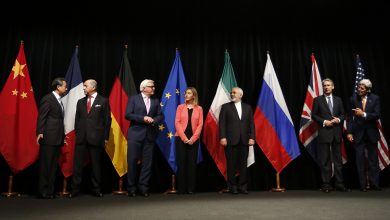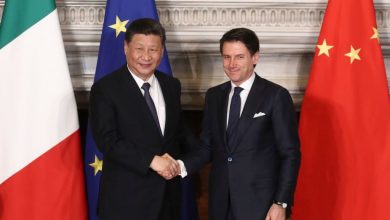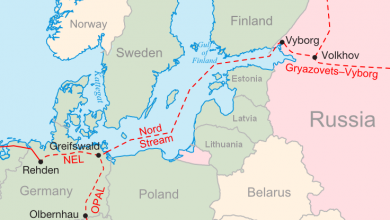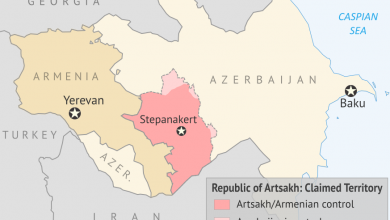Keeping the West Alive: Why the EU Needs Transatlanticism

These days the West, as a concept, seems more and more divided. French President Emmanuel Macron has recently made the headlines with his scathing comments towards NATO, in the wake of the Turkish invasion of Syria. Macron expressed his outrage by boycotting a NATO meeting scheduled for early December, and declaring the alliance “brain dead”. This follows a series of statements by Macron, painting a picture of the European Union as a military power that can obtain “strategic autonomy” from its more powerful ally, the United States.
The latest comment, however, prompted a strong, angry reaction from Angela Merkel, who delivered a barb of her own: “I understand your desire for disruptive politics, but I’m tired of picking up the pieces. Over and over, I have to glue together the cups you have broken so that we can then sit down and have a cup of tea together.”. Macron rebutted that he could not in good faith attend the meeting and pretend that nothing had happened in Syria.
We’ve Seen All This Before
International media have reported on this Franco-German spat as an unexpected low in their relationship, but when one looks closer at the long debate over European security policy, this row seems to follow a remarkably old playbook. France has traditionally been one the more NATO-sceptic of all EU Member States, while Germany sits much closer to eastern European countries at the opposite end of the spectrum, one that sees transatlantic cooperation as existential. With their words, Merkel and Macron have rekindled an old debate. Should the European Union rely on NATO for security, or should it create its own armed forces to uncouple from the United States?
The framing of this question, however, is not accurate and presents a false alternative. After all, an EU army would be just that – an army – while NATO is an alliance involving multiple countries. Why should one be an alternative to the other? The implication that they are mutually exclusive is never explained. As a military actor, the EU could also fit within NATO, and defence cooperation between the two institutions is already the norm – in fact, it’s likely to intensify under the new European Commission.

What is likelier is that this false alternative is serving a deeper political interest. NATO remains controversial in many circles, and the decades of Warsaw Pact (and later Russian) propaganda against the alliance have left a lasting mark in European public opinion. Many see NATO as an instrument of American policy-making, which is a misread since the United States rely primarily on bilateral security agreements to expand their political clout.
Others believe NATO constrains its Member States to dangerous foreign policy adventures, like Iraq, but there is no provision for offensive wars in the North Atlantic Treaty, and even its mandates on defensive wars are designed to give individual countries great leeway. In stark contrast, while not entirely free of controversy, a wholly EU defence project is much more acceptable: it doesn’t exist, after all, allowing observers to project their preferences onto it and avoid disappointment.
As we have detailed before, it is completely impossible for the EU to entirely replace NATO with purely domestic security within a reasonable timeframe. Building joint European armed forces will take decades and significant political commitment, not to mention investment. However, this material impossibility does not answer the long-term question of goals. Even if Europe accepts the present reality of NATO inevitability, should it strive for an uncoupling of the alliance over the coming decades?
The West: Stronger Together
The magnitude of the US – EU relationship is taken for granted and underestimated. When one sets out to do the math, the results are quite impressive. The European Union will be about 20% of the world economy after Brexit and is also experiencing sluggish economic growth. However, when counted together, the EU and the United States represent nearly two-thirds of the world’s GDP. The figures are similar if we look at trade and finance, and the latter is an especially weak sector for Europeans, following the collapse of the EU banking system after the Great Recession of 2008.
If the EU and the United States go their separate ways, or even pursue radically incompatible objectives as with the Iran nuclear deal, only non-Western countries will benefit. More specifically, a permanent split will likely bring China and G77 into a position stronger than any of the two Western groups in isolation. This is especially relevant because China is a unique kind of rising competitor in world history: the Chinese Communist Party plays the longest possible game, with patience and cunning, and they play it for keeps.
The rest of the world is looking for ways to react, and it’s interesting to note how Chinese economic inroads into post-Soviet Asia have immediately strengthened the ranks of the Eurasian Economic Union. Counter-balancing China is almost impossible – one needs a sizable portion of the planet to be on board to achieve parity. Should the West split into two groups, China can just manipulate one against the other – to a degree this is already happening with the Chinese Belt and Road initiative.
Of course, pluralism in the West is not just a disadvantage. Western countries can experiment with different policies, and debate is useful. But ultimately, uniting the West is herding cats, and some of the EU’s and the United States’ friends or would-be allies are far-flung and next to impossible to defend without iron-clad nuclear guarantees. More worryingly, some are already firmly in China’s sights: Japan, the Republic of Korea, Australia, New Zealand are all experiencing significant Chinese pressure and encroachment. The net result is that forging a common Western security policy will be hard regardless. But with the United States saying one thing and the EU another, it will be hopeless.

The Lifeblood Of World Policies
So far, we have focused on finance, GDP size, and share of the world economy. However, Brussels’ main limitations when evaluating a lone wolf strategy are others. The EU economy could double in size overnight and it wouldn’t make a huge strategic difference, in the sense that Brussels would still have no world policy. Indeed, the radical conclusion of even the most cursory of analyses is that the European Union is in no position and will never be in a position to maintain a world policy.
Running a world policy requires the ability to project power all over the globe. In common parlance, power projection is often mistaken for military intervention (sending troops on the ground) but that is inaccurate. Power projection in purely military terms means the ability to project power away from a country’s own shore, i.e. what kind of blue water naval capabilities are available, and what range is available to them thanks to technology and/or how many safe ports are available along the way. Economic, political and cultural pressure help smooth things over, and the latter is the field the EU specialises in. This is commonly called soft power, and it’s certainly useful – but alone it is not enough.
European powers maintained vast colonial empires precisely so they could project power far from home. As the age of colonialism faded, the United States found an alternate model of getting to the same objective: a network of bilateral security guarantees, in which American forces would protect a country in exchange for key basing rights. Even this strategy is now being confronted with its limitations, however, as the United States progressively cut back from their involvement abroad.
Power projection is, for instance, absolutely indispensable in keeping the sea lanes open. This is only one task among many, but it’s a poignant example since, without open sea lanes, there is no free trade. Without allies in the Pacific, there is no US Pacific Fleet. Without US Pacific Fleet there is no freedom of navigation in the South China Sea. Without freedom of navigation in the South China Sea, then maybe Vietnam, the Philippines, and China would have escalated their maritime dispute into a shooting war. If not, then the former two would at the very least under constant threat of Chinese naval blockade – which would immediately destroy the EU – Vietnam free trade agreement. Soft power alone would not help the West in such a scenario, and levying punitive economic measures against an opponent the size of China would be unlikely to have an impact.
In such a scenario, the EU by itself would be powerless, since the only deterrence against such an escalation is the presence of friendly navies in the Pacific. No European taxpayer would consent to the outlandish defence spending required to build a colossal blue water navy so that Brussels can back up freedom of navigation operations in the South China Sea by force. If one aims to present a tangible threat to China for deterrence purposes, those costs soar even higher. Maintaining that level of overseas deployable capabilities is simply not worth the expense.

When part of a worldwide network of friendly countries, however, the European Union could deter China without directly fielding a navy to the far side of the world. Several Pacific countries could step in to provide containment – to a degree, this is already happening since Chinese calculations have to take into account the presence of the US Pacific Fleet. Again the United States crop up as the one country able to keep a finger in every pie, and this only works because they have allies everywhere, ready to back them up in exchange for protection.
Even then, keeping the shipping lanes open is a burdensome undertaking, and Americans themselves have been winding down their involvement. Only truly global cooperation can ensure that the job is done – the idea that the European Union could back up its own agreements in far-flung corners of the world without help is simply outlandish.
The West in a Fractured World
The example of the shipping lanes is replicated in many other areas of foreign policy and security. As military equipment becomes more complex, so do logistics, to the point where only a handful of countries on Earth are capable of deploying and sustaining expeditionary forces abroad. The democratisation of military theory, technology, equipment, and training (mostly done by us Europeans, and especially the Americans) make it easier than ever for non-State actors to become threats.
All of this means that nobody other than the United States will occupy such a hegemonic position on the world stage for the foreseeable future. The European Union can stick to the West, influence it and bring its priorities to the table – or it will have to give up agency on what happens outside its neighbourhood. The Mediterranean, the EU – Russian border, and possibly the Arctic are the EU’s three security frontiers. Anything beyond that will be entirely outside our influence.
To make one example, the European Union is just not going to get an invitation to the Korean six-party talks, even though tensions in Korea rank consistently high among the primary sources of danger for international stability. Indirectly, however, Brussels does have a channel to the six-party talks, specifically through the United States. The alternative would be to eschew representation at all, and have no say on the matter of peace and war in Southeast Asia. Moreover, it is only a handful of EU Member States (France, the United Kingdom, and the Netherlands) who have an active interest in maintaining an independent world policy. Most of the EU is fine with moving responsibility up one level, to NATO and the wider network of Western cooperation, like an informal military club of liberal democracy.
The world’s powers, great and small, did not miss this. China, India, Russia, Brazil, and others have already accepted a role as potentially regional superpowers. Other countries like Turkey and Iran are trying to rise to similar roles in their regions. Most crucially, however, when the United States stop being the world hegemon, the days of world politics are going to be over, at least for the foreseeable future.
Commentators occasionally wonder whether the European Union can replace the United States as the “leader of the free world” but the truth is that it cannot, and it never will. The needed material expense and the imperial overstretch that comes with it is a vision of the past, not the future. That future is one where dictatorships outnumber democracies, where no one country can control shipping lanes or have anything to say around the world unless the whole West speaks with one voice on its core interests. Even then, limitations will be painful, and there is no way to realistically forecast how much these power relations will be impacted by climate change – but there is no viable alternative to the West.
The United States can achieve truly global power projection only with global help, and even then, they are struggling. European countries are never going to be able to do that ever again. While the European Union has a clear interest in forming its own defence forces, it will not have a say in the wider world without a strong network of alliances. The world is already fracturing; giving up on NATO and the West now would only deepen the fissures until the entire postwar order shatters beyond repair.





